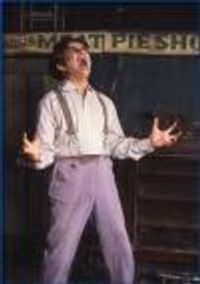1776 Reviews
GroupAGroup1
Understudy Joined: 12/30/14
#11776 Reviews
Posted: 10/6/22 at 8:16pm
David Gordon of Theatermania is Negative:
"Progress isn't casting Sherman Edwards and Peter Stone's Tony-winning musical 1776 with a BIPOC or gender-expansive company. It's casting 1776 with people who don't look like the Founding Fathers and not drawing attention to it. In that regard, Jeffrey L. Page and Diane Paulus's Roundabout Theatre Company revival at the American Airlines Theatre takes a door left ajar by Hamilton and runs right through it. But this new Broadway mounting (which originated last summer at American Repertory Theatre and will embark on a national tour next spring) wants to have it both ways — they're simultaneously hoping we notice how progressive it's trying to be, but also not really, while emphasizing the wrong things along the way. The result, while enjoyable, shows a fundamental lack of trust and understanding in material that they would see already does the work for them, if they just stopped to listen."
https://www.theatermania.com/broadway/reviews/review-1776-broadway-2022_94387.html
GroupAGroup1
Understudy Joined: 12/30/14
#21776 Reviews
Posted: 10/6/22 at 9:19pm
Frank Rizzo of Variety:
"The opening moments of this exuberant, thought-provoking and radical revival of “1776” makes it clear who was missing from John Trumbull’s famous painting of the signers of the Declaration of Independence.
As the female, transgender, non-binary and racially and ethnically diverse cast arrives on stage, exchanges street clothes for period waistcoats and literally steps into the black buckled shoes of this country’s forefathers, we know immediately that this will be a theatrical re-imagining not only of history, but the acclaimed Tony Award-winning 1969 musical.
Co-directors Diane Paulus and Jeffrey L. Page apply a bold Brechtian brush to this picture with its casting, staging, musical arrangements and design. Without changing the narrative, it adds layers of context that offer further shadings to the musical, even though at times the results are somewhat crude, clunky or overdone."
https://variety.com/2022/legit/reviews/1776-review-broadway-musical-1235394093/
GroupAGroup1
Understudy Joined: 12/30/14
#31776 Reviews
Posted: 10/6/22 at 9:34pm
Matt Windman of AMNY: "‘1776’ is reconceived for 2022 with extremely mixed results"
https://www.amny.com/entertainment/theater/review-1776-is-reconceived-for-2022-with-extremely-mixed-results/
#41776 Reviews
Posted: 10/6/22 at 9:54pm
Brian Lipton called it "often wonderful -- and occasionally problematic."
https://cititour.com/NYC_Broadway/1776/1099
Adam Feldman gives it 4 out of 5 stars.
https://www.timeout.com/newyork/theater/1776-review-broadway-revival
#51776 Reviews
Posted: 10/6/22 at 10:05pm
Steven Suskin gives it 3 out of 5 stars.
https://nystagereview.com/2022/10/06/1776-founding-fathers-declare-independence-deconstructed/
VintageSnarker
Broadway Legend Joined: 1/30/15
#61776 Reviews
Posted: 10/6/22 at 10:12pm
Given the conceit, is any publication going to send a non-cis male reviewer?
#71776 Reviews
Posted: 10/6/22 at 10:21pm
VintageSnarker said: "Given the conceit, is any publication going to send a non-cis male reviewer?"
No and no one is going to dare say anything about this because they will be accused of all sorts of things. But to me, especially watching the recent clips released, is terminally woke.
#81776 Reviews
Posted: 10/6/22 at 10:38pm
DTLI Consensus: For God's sake, John, shut up.
5 negative, 3 mixed (including the NYT), 3 positive.
https://didtheylikeit.com/shows/1776-2/
#91776 Reviews
Posted: 10/6/22 at 10:50pm
Jesse Green’s review is fair & intelligently written, and pretty much matched my own feelings about the show: an admirable effort not successfully executed.
But give me this over the type of stuffy living room drama that Roundabout has prioritized for so long.
#101776 Reviews
Posted: 10/6/22 at 10:56pm
If Camelot and Sweeney Todd both fare better in the spring, it looks like 1776 could be the one that'll get left out of Best Musical Revival at next year's Tony Awards.
#111776 Reviews
Posted: 10/6/22 at 11:06pm
ErmengardeStopSniveling said: "Jesse Green’s review is fair & intelligently written, and pretty much matched my own feelings about the show: an admirable effort not successfully executed.
But give me this over the type of stuffy living room drama that Roundabout has prioritized for so long."
It is really quite the pan though. Green is basically saying in the most polite way possible that it’s terrible. I feel bad for the cast.
dougs9797
Swing Joined: 11/13/03
#121776 Reviews
Posted: 10/6/22 at 11:26pm
About nine times out of ten I dislike productions where the director 'reimagines' the show. Too often they rewrite them instead of direct them. 1776 by its very nature does not lend itself to this stunt like casting. It cheapens both the show ant the need for diverse casting when. diverse casting is called for. The whole venture was too problematic.
#131776 Reviews
Posted: 10/7/22 at 12:48am
dougs9797 said: "About nine times out of ten I dislike productions where the director 'reimagines' the show. Too often they rewrite them instead of direct them. 1776 by its very nature does not lend itself to this stunt like casting. It cheapens both the show ant the need for diverse casting when. diverse casting is called for. The whole venture was too problematic."
No way! Fresh and new approaches to stagings have given us some of the best Broadway revivals. I certainly don't want to see a traditional approach over and over. Boring.
#141776 Reviews
Posted: 10/7/22 at 1:05am
dougs9797 said: "About nine times out of ten I dislike productions where the director 'reimagines' the show. Too often they rewrite them instead of direct them. 1776 by its very nature does not lend itself to this stunt like casting. It cheapens both the show ant the need for diverse casting when. diverse casting is called for. The whole venture was too problematic."
What is to be eschewed is laziness. We should be celebrating (and elevating) (re)imagination.
#151776 Reviews
Posted: 10/7/22 at 8:46am
I would love to have seen what Elizabeth Vincentelli thought of the show. I always enjoyed her thoughts on Theatre Talk, and in the Post.
Peter Marks of the Washington Post, gave a postitive review as well.
https://www.washingtonpost.com/theater-dance/2022/10/06/1776-broadway-female-transgender-nonbinary/
chanel
Broadway Star Joined: 1/28/04
#161776 Reviews
Posted: 10/7/22 at 11:13am
Positive Village Voice review, with only a few quibbles.
https://www.villagevoice.com/2022/10/04/the-gender-switched-1776-is-very-independent/
dougs9797
Swing Joined: 11/13/03
#171776 Reviews
Posted: 10/7/22 at 1:50pm
HogansHero said: "dougs9797 said: "About nine times out of ten I dislike productions where the director 'reimagines' the show. Too often they rewrite them instead of direct them. 1776 by its very nature does not lend itself to this stunt like casting. It cheapens both the show ant the need for diverse casting when. diverse casting is called for. The whole venture was too problematic."
What is to be eschewed is laziness. We should be celebrating (and elevating) (re)imagination."
I'll tell you what's lazy. Taking a wonderful show and bending it to your whims rather than writing your own. That's lazy. I'm tired of directors trying to mangle other people's work.
#181776 Reviews
Posted: 10/7/22 at 2:12pm
dougs9797 said: "I'll tell you what's lazy. Taking a wonderful show and bending it to your whims rather than writing your own. That's lazy. I'm tired of directors trying to mangle other people's work."
You are missing the same point as the one I responded to. You are assuming (or treating) every re-imagination to be lazy (and "bad"![]() . If the product is "mangled," or otherwise bad, then it's no good. But a wonderful re-imagination is just as good, or better, than the original, and it is a part of the tradition of theatre. The Greeks did it; Shakespeare did it; and we do it (often to their earlier work.) If you want to be a purist, that is your prerogative, but base your objection on a sound foundation.
. If the product is "mangled," or otherwise bad, then it's no good. But a wonderful re-imagination is just as good, or better, than the original, and it is a part of the tradition of theatre. The Greeks did it; Shakespeare did it; and we do it (often to their earlier work.) If you want to be a purist, that is your prerogative, but base your objection on a sound foundation.
#191776 Reviews
Posted: 10/7/22 at 2:29pm
dougs9797 said: "HogansHero said: "dougs9797 said: "About nine times out of ten I dislike productions where the director 'reimagines' the show. Too often they rewrite them instead of direct them. 1776 by its very nature does not lend itself to this stunt like casting. It cheapens both the show ant the need for diverse casting when. diverse casting is called for. The whole venture was too problematic."
What is to be eschewed is laziness. We should be celebrating (and elevating) (re)imagination."
I'll tell you what's lazy. Taking a wonderful show and bending it to your whims rather than writing your own. That's lazy. I'm tired of directors trying to mangle other people's work."
That's literally what a director does. They incorporate their own artistry into the writer's work.
#201776 Reviews
Posted: 10/7/22 at 3:30pm
blaxx said: "dougs9797 said: "HogansHero said: "dougs9797 said: "About nine times out of ten I dislike productions where the director 'reimagines' the show. Too often they rewrite them instead of direct them. 1776 by its very nature does not lend itself to this stunt like casting. It cheapens both the show ant the need for diverse casting when. diverse casting is called for. The whole venture was too problematic."
What is to be eschewed is laziness. We should be celebrating (and elevating) (re)imagination."
I'll tell you what's lazy. Taking a wonderful show and bending it to your whims rather than writing your own. That's lazy. I'm tired of directors trying to mangle other people's work."
That's literally what a director does. They incorporate their own artistry into the writer's work."
That isn’t how they came about. In Shakespeare’s days, directors were members of the acting company - literally one of the actors in the piece - who would stage it how it was intended to be, fulfilling the writer’s intention as best as possible.
Now directors really do seem to co-opt someone else’s work for their own devices.
I wonder if the estates get more of a cut when the work is not only being used, but essentially treated as source material for something new.
#211776 Reviews
Posted: 10/7/22 at 3:51pm
BorisTomashevsky said: "blaxx said: "dougs9797 said: "HogansHero said: "dougs9797 said: "About nine times out of ten I dislike productions where the director 'reimagines' the show. Too often they rewrite them instead of direct them. 1776 by its very nature does not lend itself to this stunt like casting. It cheapens both the show ant the need for diverse casting when. diverse casting is called for. The whole venture was too problematic."
What is to be eschewed is laziness. We should be celebrating (and elevating) (re)imagination."
I'll tell you what's lazy. Taking a wonderful show and bending it to your whims rather than writing your own. That's lazy. I'm tired of directors trying to mangle other people's work."
That's literally what a director does. They incorporate their own artistry into the writer's work."
That isn’t how they came about. In Shakespeare’s days, directors were members of the acting company - literally one of the actors in the piece - who would stage it how it was intended to be, fulfilling the writer’s intention as best as possible.
Now directors really do seem to co-opt someone else’s work for their own devices.
I wonder if the estates get more of a cut when the work is not only being used, but essentially treated as source material for something new."
I guess we're not in Shakespeare's days anymore?
#221776 Reviews
Posted: 10/7/22 at 4:05pm
Clearly not, but lines are still said and songs are still sung. All of which were written by somebody with an intention, and now it’s “okay” to deviate from that intention. For better or worse. In all parts of the theatre, aside from technical developments, the evolution of “director” from where it began to where it is now must be the widest.
I’m a fan of directors honoring the writer’s intention overall. When a new show is out of town, the writer doesn’t f-off on vacation. They’re there with the director to find the best way to get their message across. I don’t think directors are by-and-large there to put their own stamp on something, writer be damned.
KevinKlawitter
Broadway Legend Joined: 1/21/20
#231776 Reviews
Posted: 10/7/22 at 4:06pm
BorisTomashevsky said: "blaxx said: "dougs9797 said: "HogansHero said: "dougs9797 said: "About nine times out of ten I dislike productions where the director 'reimagines' the show. Too often they rewrite them instead of direct them. 1776 by its very nature does not lend itself to this stunt like casting. It cheapens both the show ant the need for diverse casting when. diverse casting is called for. The whole venture was too problematic."
What is to be eschewed is laziness. We should be celebrating (and elevating) (re)imagination."
I'll tell you what's lazy. Taking a wonderful show and bending it to your whims rather than writing your own. That's lazy. I'm tired of directors trying to mangle other people's work."
That's literally what a director does. They incorporate their own artistry into the writer's work."
That isn’t how they came about. In Shakespeare’s days, directors were members of the acting company - literally one of the actors in the piece - who would stage it how it was intended to be, fulfilling the writer’s intention as best as possible."
*laughs in Colley Cibber*
#241776 Reviews
Posted: 10/7/22 at 4:08pm
Yes, staging the classics (and I think it’s fair to say that 1776 is a classic at this point) is a different ball of wax. When a new play premieres, the playwright often works with the director and has some say in how it’s staged. But revivals - especially decades or centuries after the original production - must find ways to make the piece “work” for a modern audience. Sometimes this requires the piece to be rethought or deconstructed, but of course not always.
I love 1776 and had my own “non-traditional” production planned before the pandemic hit. Doing a gender-bent version of the show isn’t a novel idea. Many amateur productions have done all-female productions before. I think this is just the first time it’s been done professionally.
From what I’ve read though, the casting isn’t the only non-traditional thing about it. The directors have evidently made many other bold choices as well, which have made this production get the most wildly mixed reviews I have ever seen.
#251776 Reviews
Posted: 10/7/22 at 4:35pm
BorisTomashevsky said: "That isn’t how they came about. In Shakespeare’s days, directors were members of the acting company - literally one of the actors in the piece - who would stage it how it was intended to be, fulfilling the writer’s intention as best as possible.
Now directors really do seem to co-opt someone else’s work for their own devices.
I wonder if the estates get more of a cut when the work is not only being used, but essentially treated as source material for something new."
1. What you say about Shakespeare is a preposterous over-generalization but it is also irrelevant so let's move on from that.
2. No, estates do not get "more of a cut" because your premise is faulty. In this show (or any other I can think of) no one has licensed the source material. The existing play has been licensed and any alterations that a director wants to make have been proposed to, and approved by, the authors or the authors' estate(s). What is clear from your subsequent post is that you are not interested in what authors want but only what you want. [N.B. Any "deviation" has been "okay[ed]" by the author or their chosen delegate, so if you have a gripe, it is not with the director. And as should be evident to you from this thread, some of us would far prefer a re-imagination than the museum piece you prefer.
Videos









